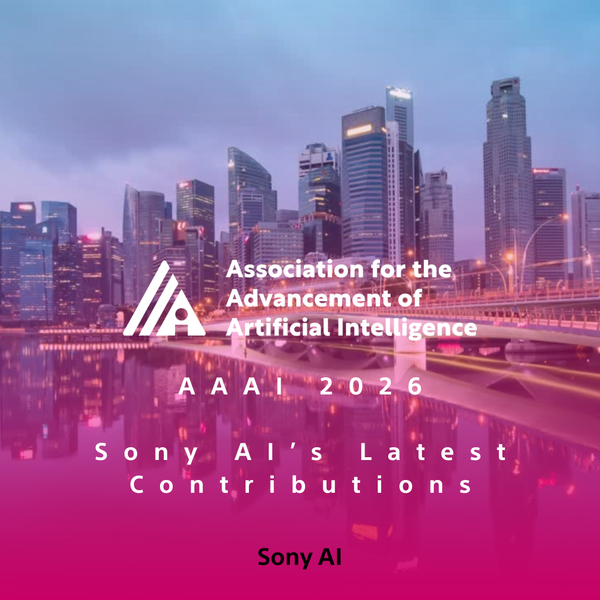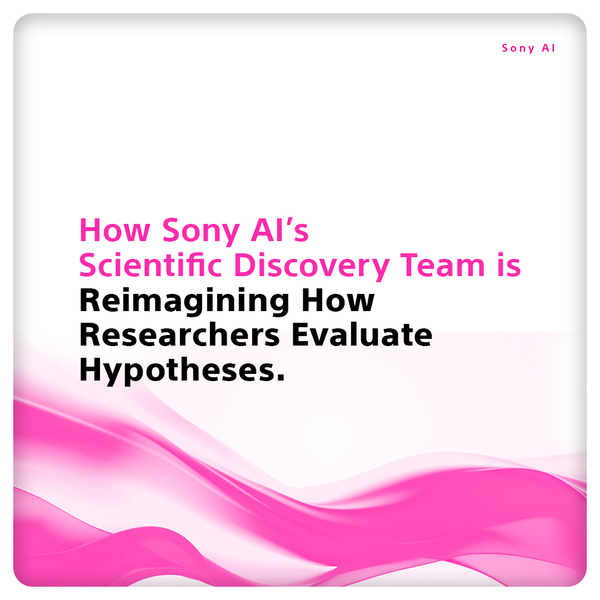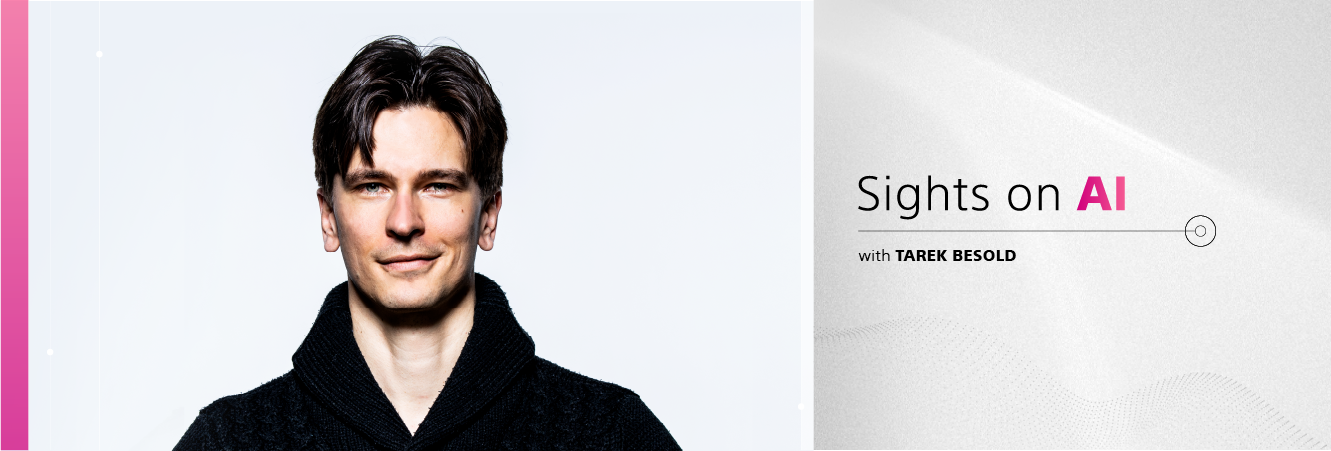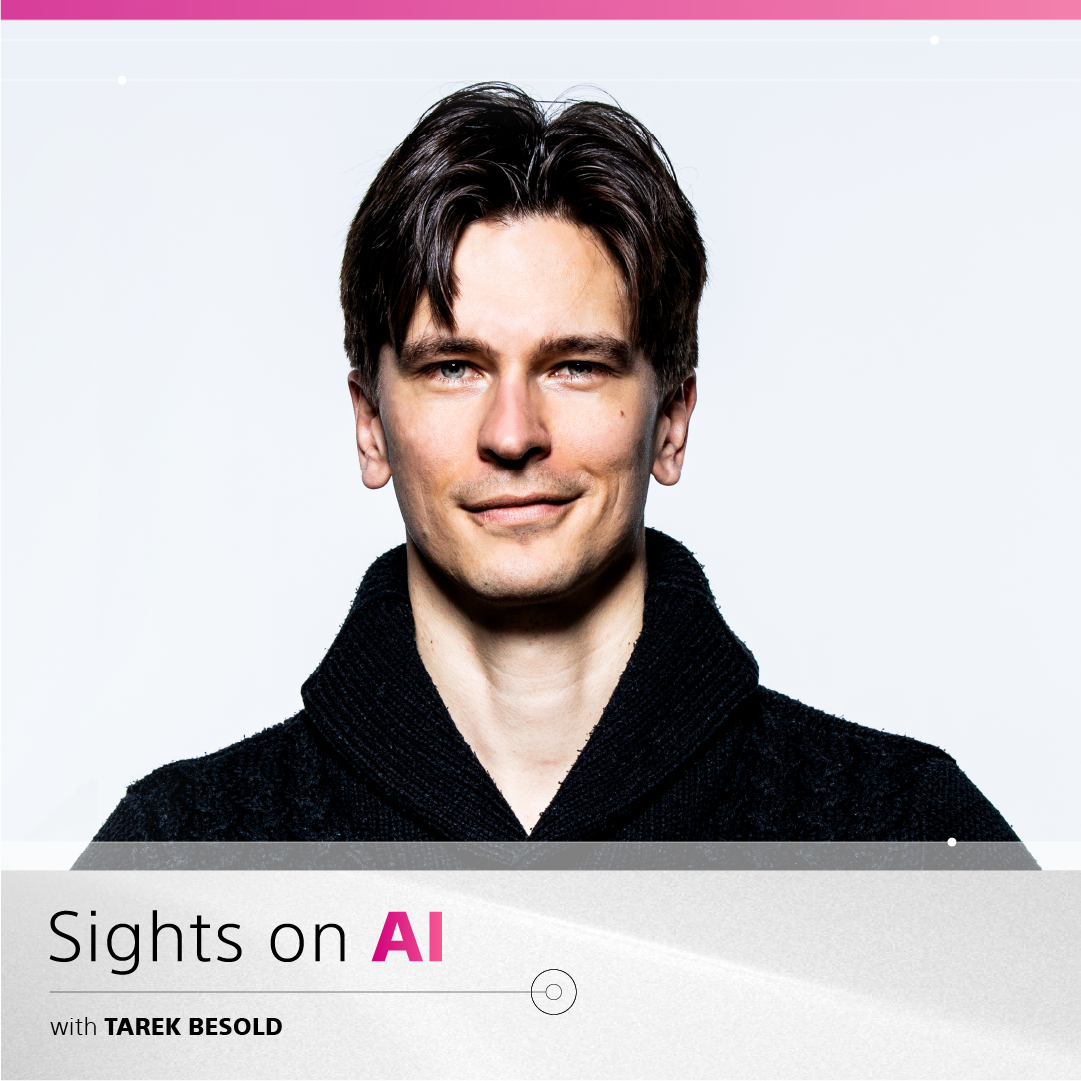Sights on AI: Tarek Besold Offers Perspective on AI for Scientific Discovery, Barcelona, and Neurosymbolic AI Systems
Sony AI
June 18, 2024
The Sony AI team is a diverse group of individuals working to accomplish one common goal: accelerate the fundamental research and development of AI and enhance human imagination and creativity, particularly in the realm of entertainment. Each individual brings different experiences, along with a unique view of the technology, to this work. This insightful Q&A series, Sights on AI, highlights the career journeys of Sony AI’s leaders and offers their perspectives on a number of AI topics.
Peter Stone ・ Erica Kato Marcus・ Tarek Besold
Tarek Besold is a Senior Research Scientist at Sony AI, overseeing the organization's Scientific Discovery Flagship Project. With a diverse background in academia and various industries, Tarek's expertise lies in the intersection of AI and cognitive science, spanning topics from computational creativity to trustworthy AI. His research journey has evolved from AI work on human-like minds to human-AI interaction and co-creative systems. Tarek holds a PhD in Cognitive Science from the Institute of Cognitive Science at the University of Osnabrück and a Master of Science in Mathematics from FAU Erlangen-Nuremberg, with parts of his studies conducted at the University of Zaragoza.
Currently, Tarek's research focuses on pioneering AI tools and systems that support the work of scientists around the world.
In this blog, Tarek shares his career journey as well as his view on how the perception of AI has shifted and the future of the field. He also gives a sneak peek into the work being conducted within Sony AI’s Scientific Discovery Flagship.
What inspired you to enter the fields of AI and cognitive science?
My journey began with a desire to understand the human mind by attempting to recreate it. Growing up in a culture rich in communication and strong family ties, I was always fascinated by what makes people tick. I pursued computer science alongside my studies in mathematics and quickly gravitated toward the intersection of psychology and computer science. This field, often referred to as cognitive science, led me to explore the possibilities of integrating technology with human cognition. I then became interested in computational creativity, developing systems that support creative processes while considering the ethical implications, such as how automation affects creative professions. The goal of this area of research is to develop the technology in a way that does not supplant creative professionals but rather empowers them—freeing them from tedious tasks so that they may focus on the “human” creative contributions that cannot be automated.
How have you seen the perception of AI change over the years?
When I started my journey in AI, the field still had not recovered from the second AI Winter that had begun in the early 1990s when people realized that knowledge-based expert systems—the AI paradigm dominant at that time—might not be the way to solve intelligence. While some AI systems were used in specific sectors, widespread adoption of AI technologies across industries or even in home environments seemed far off. However, as machine learning improved with increased computing power and data availability, the perception of AI shifted from being a fringe technology to one that could be deployed on a large scale in everyday life.
In the time I have been working in the field of AI, I have seen it change from a niche topic to a frequent theme of news headlines. This has included a shift from “no discussion” to “positive news only,” to today’s increasingly differentiated discourse around the pros and cons of developing and deploying increasingly capable AI systems.
What motivated you to join Sony AI, and what sets it apart from other organizations?
Several factors drew me to Sony AI. Firstly, the opportunity for blue-sky research, focusing on Grand Challenges with substantial commitment over several years. Secondly, Sony AI's pure focus on entertainment and supporting creators distinguishes it from other tech giants. This unique focus allows us to work on projects that target human emotions and creativity while collaborating with a talented and diverse team. The combination of ambitious research goals, a strong ethical commitment to creators, and a passionate, world-class team makes Sony AI an exceptional organization.
How can AI impact research and development in the area of scientific discovery?
AI has the potential to enhance many aspects of the work and experience of scientists and researchers, allowing them to be more efficient and expand their range of capabilities.
One example is the review of scientific or medical literature. There are hundreds of thousands of pieces of research across science and medicine dating back centuries. As we move through time and our society requires new discoveries to improve life and the environment, this previous research will always play a critical role. However, as the corpus of research grows, it will become increasingly more difficult for scientists and researchers to review it in a timely manner and conduct studies that address urgent needs. If you think about it, some studies are known to last years or decades. AI can have an impact in the review of that research – identifying and summarizing key points, connections, or patterns that could contribute to the formation of new ways of thinking about scientific, medical, societal, and environmental challenges.
Within our Scientific Discovery Flagship at Sony AI, we aim to augment the knowledge and creativity of scientists during the ideation phase of the scientific process and enable them to create new hypotheses. I am excited to provide an update on some of our work in this area in the near future.
Barcelona was recently announced as a new hub for Sony AI and the Scientific Discovery team. Why was this region selected, and what impact will it have?
Sony AI’s work is rooted in supporting creators of all types, creativity, and entertainment. Given both Barcelona’s and the Catalonia region of Spain's association with notable scientific, artistic, and culinary explorations and contributions, there was no doubt that this provided the perfect backdrop for our work.
As we explore AI in scientific discovery (including applications to some of the scientific foundations underlying gastronomic entertainment), we want to surround ourselves and work in partnership with creators and innovators—from medical and scientific researchers to chefs and sommeliers—so that we can ensure this technology enhances their work and does not hinder it.
What excites you the most about working in AI and challenging your creativity to solve complex problems?
One of the most exciting aspects of working in AI is the fusion of cutting-edge technology with the goal of enhancing humanity. As an AI researcher, I get to push the boundaries of what's possible, whether it is making AI systems more intelligent or more empathetic. But what truly drives me is the potential for these innovations to create positive experiences for people. Whether it is making content more accessible, helping creators realize their visions more efficiently, or even just adding a touch of magic to everyday life, AI has the power to transform how we interact with the world.
What are some ways in which AI has the potential to enhance creativity and imagination?
AI and creativity can be mutually reinforcing. Creativity often involves much trial and error, such as experimenting with different designs or wordings. AI excels at automating repetitive tasks and generating variations quickly. By delegating these mechanistic aspects to AI, creators can save time and focus on the true creative aspects, such as making decisions about shapes, wording, or storytelling. AI can also rapidly provide creators with a broader range of options to explore.
Additionally, when it comes to building vast, virtual worlds or complex, creative projects, AI serves as an extension of human memory and capability. It can help manage and organize intricate details, providing creators with a more comprehensive canvas on which to work. Lastly, AI can offer insights and suggestions that spark new ideas or push creative boundaries, acting as a catalyst for innovation. AI systems have become increasingly proficient at generating diverse content, such as language, images, sound, and music; but can we push this further? For example, can we have systems that generate interesting or entertaining pairings of text and images, images and music, or can we even push it into other modalities, such as smell or touch, or all of these?
There has been a great deal of exciting advancement in the frameworks and training methods used to develop AI technologies. What technical trends are you most excited about?
One of the most notable trends I’m interested in is the move towards smaller, more specialized datasets. A lot of what has happened in AI over the last decade was enabled by the abundance of data available indiscriminately on the Internet. What we are now looking at is trying to build systems that have to be super precise and super-specialized, for instance, because they are deployed in scenarios where there is little or no margin for error or because they are supposed to deliver a solution hyper-personalized to the individual user.
The challenge with creating these more specialized systems is that there is very little suitable data to work with. So, while large datasets have been a driving force in AI advancement to date, we'll see an increasing focus on making AI systems excel with limited data. This will require the incorporation of domain knowledge infused with machine learning to drive the next wave of AI progress, giving rise to neurosymbolic systems.
I am personally interested in exploring the future development of neurosymbolic systems, which have the potential to become more reliable in a context like science. With input from experts, such as chemists, physicists, or physicians, AI experts will be able to combine the symbols and rule-based logic from particular domains with machine learning and neural networks to provide deeper insight.
For more information on Sony AI’s Scientific Discovery Flagship, read on.
Latest Blog

February 2, 2026 | Sony AI
Advancing AI: Highlights from January
January set the tone for the year ahead at Sony AI, with work that spans foundational research, scientific discovery, and global engagement with the research community.This month’s…

January 30, 2026 | Sony AI
Sony AI’s Contributions at AAAI 2026
Sony AI’s Contributions at AAAI 2026AAAI 2026 is a reminder that progress in AI isn’t one straight line. This year’s Sony AI contributions span improving and enhancing continual le…

January 26, 2026 | Sony AI
How Sony AI’s Scientific Discovery Team is Reimagining How Researchers Evaluate …
In today’s research landscape, thousands of scientific papers are published each day; a metaphorical sea of knowledge. Even domain experts struggle to keep up. As Pablo Sánchez Mar…







